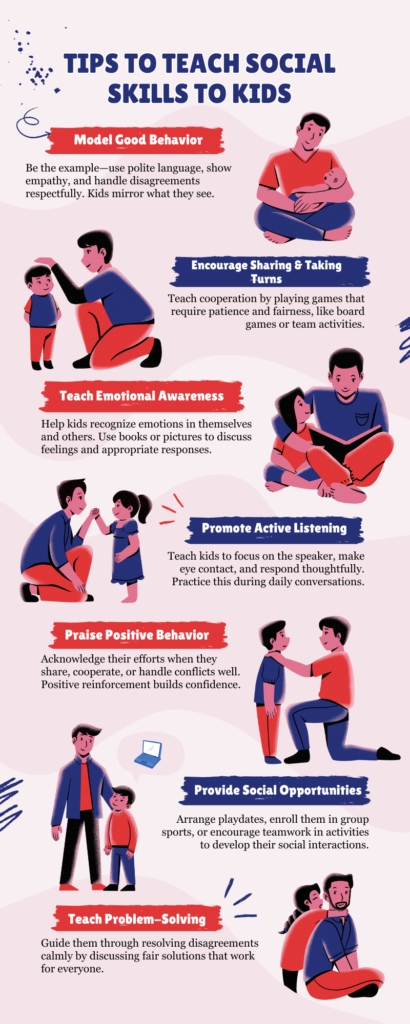Tips on Effective Parenting Skills: 20+ Proven Ways
Looking for tips on effective parenting skills? Want to know how to build a strong, positive relationship with your child while nurturing their growth and development? Parenting can be both a rewarding and challenging journey, but with the right tools and mindset, you can create an environment that fosters confidence, respect, and love.
In this blog, we’ll explore practical strategies to help you navigate the ups and downs of raising children, from communication techniques to setting boundaries and everything in between.
Whether you’re a first-time parent or a seasoned pro, these insights will equip you with the skills to handle everyday parenting challenges with confidence and care. Let’s dive in with the basics.
The Role of Good Parenting in Your Child
The pillar that will hold the emotional, social, and cognitive development of a child is good parenting. Although every family is unique, there are some basic fundamental principles that effective parents from a variety of backgrounds have in common. Most importantly, it means creating a place in which he/she feels as though they will be listened to, protected, and valued. In addition, it covers more than food, shelter, and clothing; it also entails nurturing an environment where a child can grow into a well-rounded, confident, and emotionally healthy individual.
How to Become the Best Parents? Top Tips on Effective Parenting Skills
Here are some key tips on effective parenting skills:
Building A Strong Foundation
1. Unconditional love
Your child must know that you love them no matter what. It means loving from the heart not only when one is succeeding but also at times of struggle, especially when one makes mistakes.
Love is in everything: small hugging, a smile, and a simple “I am proud of you.” Research states that children who feel completely loved will probably grow up to have high self-esteem and better-coping mechanisms. Another study, “Parental Warmth and Flourishing in Mid-Life” found that affectionate parenting is linked to an 18% reduced risk of depression and a 17% lower likelihood of illicit drug use.
2. Spend Quality Time Together
Your time is the most precious gift you can give. Whether bedtime stories, baking cookies, or chatting about their day, they will strengthen your bond and create some fantastic memories. Even 15 minutes a day of close attention greatly enhances the relationship. You can coordinate activities such as family game nights or nature walks and even work on puzzles together.
3. Let Your Kids Feel Secure
Children grow in environments where they feel safe. This includes the emotional and physical aspects. Promise them that you will stick to all the promises, maintain the same routine, and be there as an advocate in uncertain times.
Precede them with an explanation of what will go on during the move or a new place for schooling. This keeps them feeling that there indeed is a sense of trust and emotional tether inside them, making them fissile and healthy in their development.
Encouragement of Positive Behavior
4. Set Clear Limits
Children need boundaries to feel secure. Establish rules, then discuss the reasons behind them. For instance, “No television until homework is completed” teaches responsibility and also demonstrates time management. Consistent boundaries will enable children to realize the limits and provide for their own self-regard. Research has shown that children with firm but fair rules are likely to excel at both academic and social levels.
5. Be Consistent
Disciplining requires a lot of consistency. If it is 8 PM for bedtime today, it must be 8 PM tomorrow. Mixed signals confuse children and can trigger their behavioral problems. For example, sometimes skipping chores would coax them into more boundary-testing later. A constant environment ensures they have a feeling of safety and is shown to improve their behavior considerably.
6. Use of Positive Reinforcement
Celebrate good behavior with praise, cuddling, or minor prizes, e.g., “You cleaned up your toys without being asked-great job!” According to psychologists, reinforcement must be more likely than punishment to be effective in shaping behavior because it encourages children to repeat good actions.
7. Criticize the Behavior, Not the Child
Focus on the act, not the person. For example, instead of saying, “You are so messy,” say, “Let’s work on keeping your room neat.” It builds self-esteem and prevents children from internalizing harmful labels.
Communicating Effectively
8. Listen to Your Child
Genuinely care for what goes into the heart and mind of a child. Set aside distractions and look at the child when he or she is talking. Reinforce the feelings with verbs and phrases, such as “I understand you’re very upset.” Active listening earns trust and creates a sense that his or her voice matters. A child who tells you school concerns should listen closely and answer empathetically, as in, “Oh, that’s pretty rough. What can I do to help?”
9. Clearly Articulate Expectations
Be specific about what you are expecting. Instead of saying, “Behave,” say, “Please sit quietly while at the doctor’s office.” Specificity reduces confusion and gives children absolutely no doubt about what is expected from them.
10. Ask for Their Concerns
The kind of relationship with the child has opened up for free sharing about worries and dreams. Example questions you can ask include: “What was the best part of today for you?” “Did something get to you today?” This has shown the individual is caring and encourages openness. Studies also show that kids who develop open communication with parents usually avoid riskier lives as they grow older.
Setting the Standards as a Positive Model
11. Demonstrate the Behavior to Expect
Children learn through observation. Show kindness, patience, and perseverance in your actions. For example, instead of expecting them to apologize, show them how by saying, “I am sorry that I lost my temper earlier.” All leading by example teaches them valuable life skills.
12. Teach Social Skills
Teach them how to share, take turns, and resolve conflicts respectfully. Make it more fun and interactive by pretending to be two friends quarreling about a toy and demonstrating the process for them.

13. Manage Your Stress
Your emotions will affect your child. Take care of yourself through exercise or meditation or by simply doing things that make you happy. A calm parent makes a calm house. Research shows that kids whose parents are stressed are more prone to developing anxiety themselves, hence the need to control their stress levels.
Teaching Responsibility and Life Skills
14. Take Them through Mistakes
Using them as opportunities for lesson learning rather than punishment is, thus, “Far better is what we could learn from it.” This encourages problem-solving and resilience-building behavior. For instance, if they are careless and break their favorite toy, take the time to work with them to understand why things got such an outcome and how to take better care of their belongings.
15. Encourage Freewill
Encourage your child to pack their school bag or do the house chores according to age. Develops self-identity by self-efficacy. Independent children do better academically and socially, it has been claimed. If your kid faces issues interacting socially, encouraging freewill helps them build confidence and problem-solving skills, making it easier to connect with others over time.
16. Learned Stuff
Make them retrieve the education by letting it light fun. Begin igniting their curiosity or questioning or aligning it with something they take a keen interest in. For example, suppose dinosaurs are all the rage; get them books and games on those subjects. And a love for learning ends up being the grease for lifelong success.
Advocating Emotional Health
17. Creating Comfort in Scary Situations
Teach them to recognize feelings and express them in healthy ways. Say, “It’s okay to get angry, but let’s talk about it instead of yelling.” Teach them tangible techniques, like deep breathing or counting to ten, to calm down.
18. Encourage
Guide them with patience and understanding when they experience difficulty. Remind children that making mistakes is part of growing up, such as when they have failed a test, and guide them through reviewing mistakes to make a plan to improve.
19. Encourage with Rewards
Let them appreciate what they have and appreciate progress, however little it may seem. Encourage a statement like, “You worked very hard on that puzzle; I’m impressed!” which increases self-confidence and even persistence.
Discipline with Love
20. Be Firm, Fair, and Friendly
Discipline does not mean pressuring. You have to be firm in rules, fair in reasoning, and friendly in tone. For example, instead of shouting at a kid and saying that the screen time is limited, it is better to make them understand with calm reasoning.
21. Behavior Management
Misbehaviors are responded to immediately and calmly. They should involve time-outs and lose privileges; always explain why their actions were inappropriate. Example of explanation: “Throwing toys may hurt someone; hence, we have to put away the toys for now.”
22. Gossip About Your Children (Positively!)
Let your children eavesdrop on conversations in which you personally praise them to others. “She is so helpful around her house” will boost their believability as they motivate good behavior. Indirection is a good means of reinforcement and works powerfully on children.
Final Thoughts
Parenting is a journey that requires patience, consistency, and a genuine love for your child. By incorporating these tips on effective parenting skills, you can create a nurturing environment that fosters emotional health, positive behavior, and a sense of responsibility. Whether you’re guiding your child through everyday challenges or helping them navigate big life changes, these practical strategies will support your efforts in raising a well-rounded, confident individual. Remember, the key is to show up with love, understanding consistently, and a commitment to their growth. Happy parenting!




